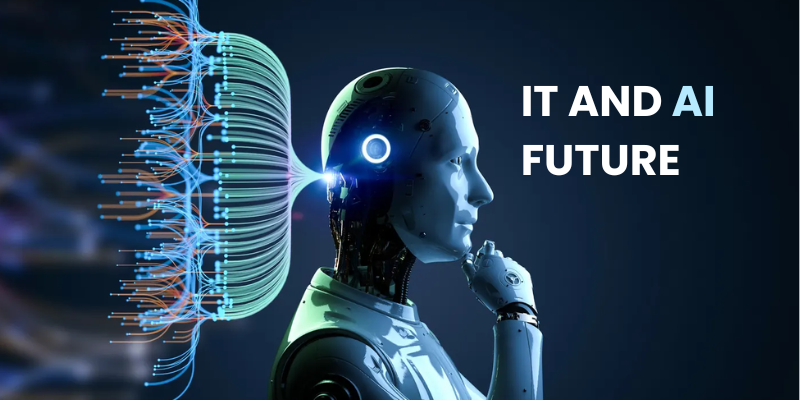
AI has rapidly developed from science fiction to a necessary component of everyday life, significantly impacting industries outside of IT, such as manufacturing, healthcare, and finance. Artificial Intelligence (AI) strives to develop intelligent systems lacking direct human involvement by utilizing complex algorithms to produce human-like abilities and breakthroughs. This blog will explore the future of Information Technology and Artificial Intelligence. If you want to learn more about Artificial Intelligence, enrol in the Artificial Intelligence Course in Chennai and gain more knowledge on AI.
The Impact of AI on Information Technology
More Secure Systems
Data security emerges as paramount when discussing how AI will change the future. Artificial Intelligence equips systems with advanced algorithms and machine learning, constructing robust security layers. These advancements will address current system gaps, detect potential threats, and ensure data integrity, underscoring the importance of security.
Enhanced Coding Productivity
Artificial Intelligence systems have been designed to offer coding advice, which has helped boost productivity and efficiency while giving developers clear, error-free code. The AI system can make helpful recommendations based on the code’s structure, which will increase overall productivity and reduce downtime throughout the production process.
Increased Automation
Automation offers the significant advantage of reducing or eliminating the need for human intervention to accomplish many “legwork” tasks. IT departments can significantly reduce the person-hours spent on backend processes and enable various cost savings by automating them with deep learning applications.
Improved Quality Assurance
A significant portion of quality assurance ensures the appropriate tools are employed throughout the development cycle. By enrolling in an Artificial Intelligence Online Course, software engineers gain insights into using the right tools to address a variety of bugs and issues within applications. With this knowledge and AI methodologies, engineers can automatically adjust during the development cycle.
How Are Artificial Intelligence and Information Technology Integrated?
AI in Service Management
AI and machine learning improve service management by using available resources best to provide quicker and more affordable solutions. It makes self-resolving service desks possible through machine learning. By tracking user behaviour and analyzing data to suggest solutions, AI improves the customer experience. Furthermore, AI-powered Computer Vision (CV) replicates human vision faster and more accurately by automating visual interpretation from various media formats. Ultimately, AI gives IT workers strategic insights, streamlining workflows and supporting all-encompassing business plans.
AI for IT Operations (AIOps)
With artificial Intelligence (AI), particularly machine learning and big data, AIOps uses a single platform to manage IT operations. Automating data processing makes proactive IT infrastructure improvements and ongoing analysis possible. Growing data volumes, various information sources, and complicated system modifications are the leading causes of the growing use of AIOps, making it difficult for experts to monitor and resolve problems effectively.
AI in Business Process Automation
The main benefit of AI in the IT industry is automation, which drastically lowers the need for manual intervention. Future AI applications emphasize automation’s centrality in IT. Algorithms promise more sophisticated network management and autonomous software development. Artificial Intelligence (AI) is meant to handle software development independently, understanding the motivations behind the code and fixing issues before they arise. As AI develops, network management will become more automated due to its ability to recognize patterns and optimize processes.
AI in Fraud Detection
While modern technology helps businesses detect fraud, it also gives cybercriminals more opportunities. Businesses use statistical analysis and artificial intelligence (AI) tools as part of a multi-layered fraud detection strategy. Specifically, machine learning is particularly good at quickly processing large amounts of data and can improve accuracy over time.
As we grapple with what is the future of artificial Intelligence and how AI will change the future, its transformative impact on information technology becomes absolute. With the help of its Machine Learning and Deep Learning capabilities, this technology is revolutionizing several industry sectors. Individuals seeking expertise can benefit from specialized courses offered by a leading Training Institute in Chennai, enhancing their understanding and proficiency in areas requiring significant human attention.
Also Read: Artificial Intelligence Interview Questions and Answers
